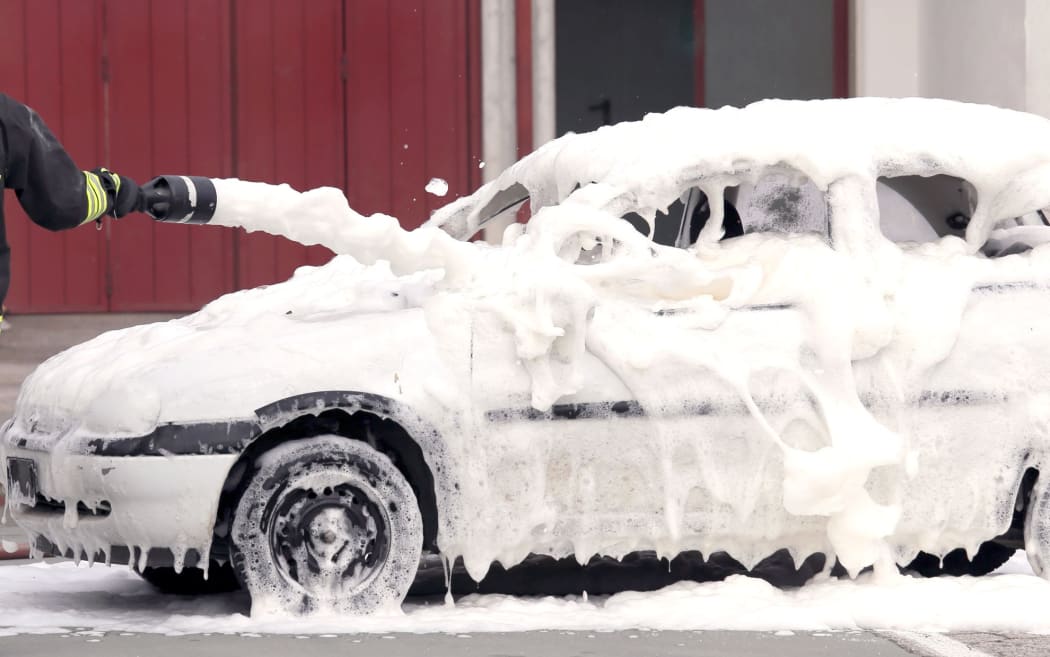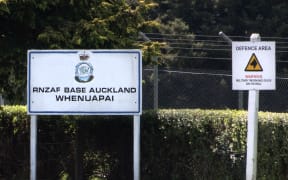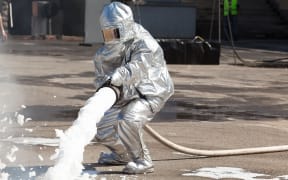An Australian anti-pollution group says New Zealand should learn from a parliamentary inquiry into firefighting foam across the Tasman.

Firefighting foam (file photo) Photo: 123RF
People from Williamtown, near Newcastle, New South Wales, told the federal inquiry yesterday how their property values, businesses and lives were being wrecked in the wake of the contamination from a nearby air force base.
Australia and New Zealand are both engaged in environmental investigations into the threat to soil and water from the PFAS group of chemicals found in foam and other products.
Australian Defence Force revealed the pollution to the public in 2015, and its New Zealand counterpart did the same in 2017, each going public at least three years after they first learned of it themselves.
The New Zealand government is relying on health and technical advice from the Australian government, including for setting safe thresholds of exposure to PFAS.
The Williamtown hearing showed that was unwise, said Chris Fogarty of the newly formed Coalition Against PFAS in Australia.
"What we are saying is the New Zealand government needs to be very careful where it is getting its advice from.
"What you heard in these hearings, was a forensic dismantling of the advice that's been given.
"[It] has often been plain wrong, or there have been mixed messages or there has been absolutely no information at all."
The contamination zone at Williamtown has twice been expanded, most recently ensnaring architect and coalition member Justin Hamilton.
"From my property I can ride a horse onto the beach. So it's a very valuable parcel of land," he told the inquiry.
"I bought it for about $700,000 twelve years ago. It should be worth between $1.5 and $1.9 million now. I can't sell the house, I can't borrow against it, I can't conscionably let anybody rent it, and I can't grow veggies there."
He knew of a baby whose blood had just tested at 40 times the safe level of the chemicals, with exposure thought to have come from eating ducks' eggs.
Samantha Kelly told the inquiry her family sold their property at a loss now amounting to $100,000 after alarming blood tests on their baby in late 2016.
"He was almost three times more contaminated than me, his birth mother, at nine months of age.
"Two weeks later we abandoned the house and set about renting in Newcastle."
They disclosed to the new buyer the house was contaminated, but she said they were not told this themselves when they bought it in 2013, even though indications were the local council knew.
"Any family who wants to leave this red zone has to take either a significant financial loss or basically experience bankruptcy just to have the freedom to protect their children.
"Our government knows that our children are being exposed to chemicals and ongoing poisoning, and they're doing nothing. It's revolting."
Local state and federal Labor MPs told the inquiry the federal government's response had been a "debacle" and "shameful".
The official health advice shared by Australia and New Zealand is that there is no conclusive evidence that exposure to PFASs damages human health, but it cannot be ruled out either.
Unlike New Zealand, Australia is yet to ban the two most prominent PFAS chemicals, PFOS and PFOA.
New Zealand authorities have said a lot less firefighting foam has been used, though neither the Defence Force nor Fire Service have records to show this.





